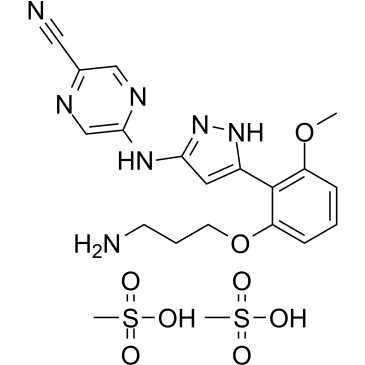Prexasertib dimesylate (Synonyms: LY2606368 dimesylate) |
| Katalog-Nr.GC60301 |
Prexasertib-Dimesylat (LY2606368-Dimesylat) ist ein selektiver, ATP-kompetitiver Checkpoint-Kinase-1-(CHK1-)Inhibitor der zweiten Generation mit einem Ki von 0,9 nM und einem IC50 von < 1 nM. Prexasertib-Dimesylat hemmt CHK2 (IC50 = 8 nM) und RSK1 (IC50 = 9 nM). Prexasertib-Dimesilat verursacht einen Bruch der doppelstrÄngigen DNA und eine Replikationskatastrophe, die zu Apoptose fÜhrt. Prexasertib-Dimesylat zeigt eine starke AntitumoraktivitÄt.
Products are for research use only. Not for human use. We do not sell to patients.

Cas No.: 1234015-58-7
Sample solution is provided at 25 µL, 10mM.
Prexasertib dimesylate (LY2606368 dimesylate) is a selective, ATP-competitive second-generation checkpoint kinase 1 (CHK1) inhibitor with a Ki of 0.9 nM and an IC50 of <1 nM. Prexasertib dimesylate inhibits CHK2 (IC50=8 nM) and RSK1 (IC50=9 nM). Prexasertib dimesylate causes double-stranded DNA breakage and replication catastrophe resulting in apoptosis. Prexasertib dimesylate shows potent anti-tumor activity[1][2].
Prexasertib dimesylate (LY2606368 dimesylate) inhibits MELK (IC50=38 nM), SIK (IC50=42 nM), BRSK2 (IC50=48 nM), ARK5 (IC50=64 nM). Prexasertib dimesylate requires CDC25A and CDK2 to cause DNA damage[1]. Prexasertib dimesylate (33, 100 nM; for 7 hours) results in DNA damage during S-phase in HeLa cells[1]. Prexasertib dimesylate (8-250 nM; pre-treated for 15 minutes) inhibits CHK1 autophosphorylation (S296) and CHK2 autophosphorylation (S516) in HT-29 cells[1]. Prexasertib dimesylate (4 nM; 24 hours) results in a large shift in cell-cycle populations from G1 and G2-M to S-phase with an accompanied induction of H2AX phosphorylation in U-2 OS cells[1]. Prexasertib dimesylate (33 nM; for 12 hours) causes chromosomal fragmentation in HeLa cells. Prexasertib dimesylate (100 nM; 0.5 to 9 hours) induces replication stress and depletes the pool of available RPA2 for binding to DNA[1]. Cell Cycle Analysis[1] Cell Line: HeLa cells
Prexasertib dimesylate (LY2606368 dimesylate; 1-10 mg/kg; SC; twice daily for 3 days, rest 4 days; for three cycles) causes growth inhibition in tumor xenografts[1]. Prexasertib dimesylate (15 mg/kg; SC) causes CHK1 inhibition in the blood and the phosphorylation of both H2AX (S139) and RPA2 (S4/S8)[1]. Animal Model: Female CD-1 nu-/nu- mice (26-28 g) with Calu-6 cells[1]
[1]. King C, et al. LY2606368 Causes Replication Catastrophe and Antitumor Effects through CHK1-Dependent Mechanisms. Mol Cancer Ther. 2015 Sep;14(9):2004-1 [2]. Yin Y, et al. Chk1 inhibition potentiates the therapeutic efficacy of PARP inhibitor BMN673 in gastric cancer. Am J Cancer Res. 2017 Mar 1;7(3):473-483.
Average Rating: 5 (Based on Reviews and 17 reference(s) in Google Scholar.)
GLPBIO products are for RESEARCH USE ONLY. Please make sure your review or question is research based.
Required fields are marked with *




















